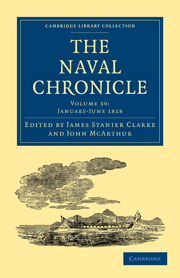 The Naval Chronicle
The Naval Chronicle Book contents
- Frontmatter
- PLATES IN VOLUME XXXIX. From Original Designs
- PREFACE TO THE THIRTY-NINTH VOLUME
- BIOGRAPHICAL MEMOIR OF CAPTAIN GEORGE MUNDY, C.B.
- BIOGRAPHICAL MEMOIR OF THE LATE SIR HUGH PALLISER, BART. ADMIRAL OF THE WHITE, &c.
- ADDENDA TO THE BIOGRAPHICAL MEMOIR OF CAPTAIN WILLIAM LAYMAN, OF THE ROYAL NAVY
- BIOGRAPHICAL MEMOIR OF THE LATE MARTIN NEVILLE, ESQ. COMMANDER, R.N.
- BIOGRAPHICAL MEMOIR OF THE LATE CONWAY SHIPLEY, ESQ. CAPTAIN R.N.
- BIOGRAPHICAL MEMOIR OF THE LATE CAPTAIN BETTESWORTH, R.N.
- INDEX
ADDENDA TO THE BIOGRAPHICAL MEMOIR OF CAPTAIN WILLIAM LAYMAN, OF THE ROYAL NAVY
Published online by Cambridge University Press: 10 January 2011
- Frontmatter
- PLATES IN VOLUME XXXIX. From Original Designs
- PREFACE TO THE THIRTY-NINTH VOLUME
- BIOGRAPHICAL MEMOIR OF CAPTAIN GEORGE MUNDY, C.B.
- BIOGRAPHICAL MEMOIR OF THE LATE SIR HUGH PALLISER, BART. ADMIRAL OF THE WHITE, &c.
- ADDENDA TO THE BIOGRAPHICAL MEMOIR OF CAPTAIN WILLIAM LAYMAN, OF THE ROYAL NAVY
- BIOGRAPHICAL MEMOIR OF THE LATE MARTIN NEVILLE, ESQ. COMMANDER, R.N.
- BIOGRAPHICAL MEMOIR OF THE LATE CONWAY SHIPLEY, ESQ. CAPTAIN R.N.
- BIOGRAPHICAL MEMOIR OF THE LATE CAPTAIN BETTESWORTH, R.N.
- INDEX
Summary
IN pursuance of our wish to give publicity to the meritorious exertions of an able and active naval officer, we insert the following Addenda to our memoir of Captain Layman's public services.
Soon after Captain Layman had written some suggestions founded on the equitable principles of Lord Nelson's excellent plan for regulating an officer's promotion by his merits, inserted in our 38th Volume, p. 36, under the signature of Precursor, he received a circular letter from the Admiralty, on the 26th of August, 1817, of which the following is the substance:–
“It being frequently found necessary to ascertain in what ships individual officers have been at different times serving, my Lords Commissioners of the Admiralty have commanded me to desire that you will be so good as to fill up the inclosed form as accurately as your recollection may enable you to do, from your original entrance into the service up to the present time. You will please to sign your name at full length at the foot of the return.
(Signed) John Croker, Sec.”
Captain Layman returned for answer:–
“Agreeable to desire, I have filled up the list to the best of my recollection as to time of servitude, and as the paper is stated to be a ‘Memorandum of Services,’ to which I am required to sign my name, I beg leave to add, that when master's mate of the Myrmidon, I did, at the age of 17 years, scuttle the ’tween decks in a very heavy gale of wind, to which measure was attributed the preservation of the ship. […]
- Type
- Chapter
- Information
- The Naval ChronicleContaining a General and Biographical History of the Royal Navy of the United Kingdom with a Variety of Original Papers on Nautical Subjects, pp. 177 - 264Publisher: Cambridge University PressPrint publication year: 2010First published in: 1818


